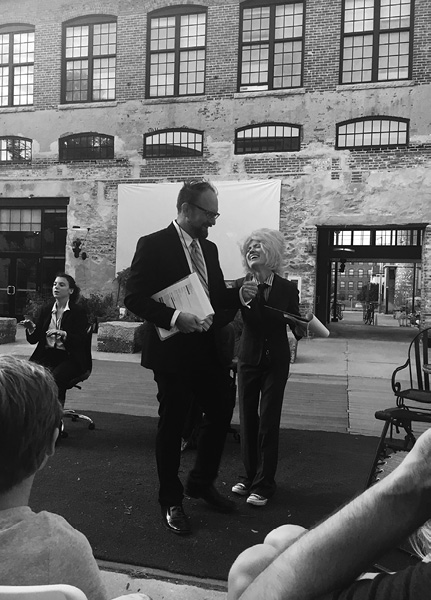
THE HAPPY END
first performed on August 3, 2018
A courtyard on 60 Valley Street, Providence, RI
performed twice in 2018
DARCIE DENNIGAN / MÓNICA DE LA TORRE
Kate Colby, Matt Derby, Zoe Guttenplan, Stine An, Cody Curran
Providence, RI / Pawtucket, RI / Brooklyn, NY / Jersey City, NJ
721536855d721536855a721536855r721536855c721536855i721536855e721536855d721536855e721536855n721536855n721536855i721536855g721536855a721536855n721536855@721536855g721536855m721536855a721536855i721536855l721536855.721536855c721536855o721536855m
THE HAPPY END
DARCIE DENNIGAN / MÓNICA DE LA TORRE
The problematic this performance was made to address is poetry readings. How to take work I love in book form, work that both begs to be embodied and yet might die behind a podium. . .?
The Happy End/All Welcome, Mónica de la Torre’s poems of corporatese, found language, synesthesia, and non-sense was one such book.
I have long been exploring feminine (and –ist) absurdity and had been on a quest for another contemporary female absurdist whose work I might stage. To me, absurdity begs for embodiment—we need to see Sisyphus push the rock up the hill and hear it roll down. When I discovered The Happy End/All Welcome, I needed to see de la Torre’s utter situational futility play out before me.
Providence, RI, has a rich history of poets theater, not the least example of which is Keith and Rosmarie Waldrops’ 1970s Wastepaper Theatre. I have aspired to contribute to and build upon this history, and since de la Torre’s book is the end (for now) of a line of modulating multidisciplinary inspiration, it seemed the perfect place to begin: The Happy End/All Welcome takes off from German artist Martin Kippenberger’s 1994 installation “The Happy End of Franz Kafka’s Amerika,” which presents a collection of odd chairs on a playing field. The manuscript of Kafka’s Amerika culminates in the fantastical “Nature Theatre of Oklahoma,” which is a job fair held in a strange stadium. It’s a novel Kafka never finished and one Kippenberger never read, and that unfinishedness, as well as the willed ignorance, were invitations to me to stage an absurdist job fair.
On an AstroTurf-covered outdoor courtyard, three poets played triple parts as impossible job candidates; unwitting participants in endless, circuitous ballgame; and their very roles in de la Torre’s loopy text. A fiction writer played the parts of Recruiter/Boss/Director; the performance began with him walking around the neighborhood, calling people to the job fair. His suit was the only one that was not ill fitting.
The Happy End/All Welcome appropriately stripped its subject of any kind of purpose-furnishing narrative. My script and staging of that book fills in some of those blanks, not through additional narrative, but through movement, costume and the bodies that, in spite of technology and workplace automation, we do still require in order to thrive and survive in the world.